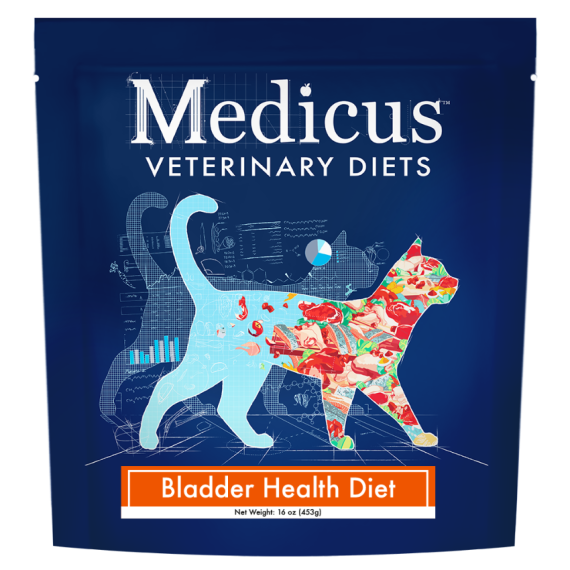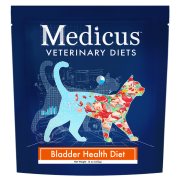Medicus 貓科動物凍乾膀胱和尿道護理飲食配方 (只適用於已被確診患有膀胱病的貓隻) ~ 16安士
型號: MV562910-7存貨狀態: 2-3 Days
數量
| 分享至 |
|
Medicus Bladder Health Diets for cats are therapeutic meals designed to provide the unique nutritional framework needed for bladder health.
Diet Overview
Designed to protect the bladder and decrease the factors that contribute to struvite crystals.
The Medicus Feline Bladder Health Diet is made with real, whole foods picked for their unique properties.
It’s nutrition that’s been clinically tested to dissolve and prevent struvite stones and minimize calcium oxalate formation.
Highlights
- High-quality digestible meat proteins
- Moderate carbohydrate
- Low calcium, phosphorus, and ash
- Moderate pH
- Healthy fats – Omega 6: Omega 3 Ratio 0.57:1
- Antioxidant
Who would benefit from this diet?
- FLUTD
- Crystalluria
- Bladder Stone
How It Works
The Medicus Feline Bladder Health Diet is meticulously crafted to address these key nutritional needs:
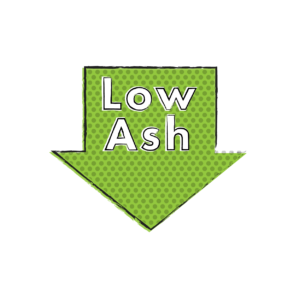
Lowers the Components That Makeup Struvite Crystals
- Reduced levels of calcium and phosphorus
- Moderated levels of magnesium
- Low ash content
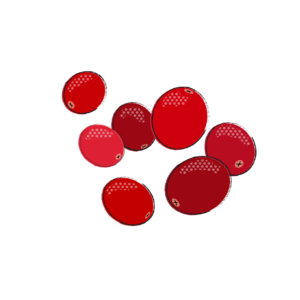
Moderates pH to proper levels
- Moderate pH with cranberry & apple cider vinegar

Protects the Bladder
- Potassium Salt to increase urination
- Glucosamine coats the inner lining of the bladder to protect from irritation
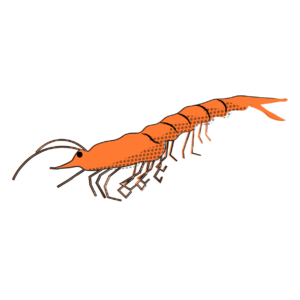
Decreases Inflammation
- Moderate carbohydrate
Antioxidants from cranberry & blueberry
- Omega-3 fatty acids from ground krill
Nutrients vs Ingredients
Where Other Diets Fall Short
Other industry diets meet the nutrient profiles needed to address a disease state but do so using poor-quality ingredients like meat meals, corn, and a lengthy list of synthetic nutrients.
We know that when an animal is sick, nutrition matters most and that you can provide a therapeutic bladder diet with whole foods.
Compare Our Ingredients
Medicus
Chicken, Egg, Rice, Flaxseed, Chicken Liver, Chicken Gizzards, Ground Krill, Cranberries, Blueberries, Potassium salt, Sea salt, Ground Egg Shell, Apple Cider Vinegar, Glucosamine, Mixed Tocopherols, Zinc Proteinate, Niacin, Riboflavin, Thiamine, Vitamin B12, Pyridoxine, Folic Acid, & Kelp
Hill’s® c/d DryPurina® UR DryBlue Buffalo® W+U DryChicken, Whole Grain Corn, Corn Gluten Meal, Whole Grain Wheat, Brewers Rice, Chicken Fat, Chicken Meal, Egg Product, Pork Flavor, Soybean Oil, Fish Oil, L-Lysine, Lactic Acid, Calcium Sulfate, Potassium Chloride, Choline Chloride, Potassium Citrate, vitamins (Vitamin E Supplement, Niacin Supplement, Thiamine Mononitrate, Calcium Pantothenate, Pyridoxine Hydrochloride, Vitamin A Supplement, Riboflavin Supplement, Biotin, Vitamin B12 Supplement, Folic Acid, Vitamin D3 Supplement), Taurine, DL-Methionine, Iodized Salt, minerals (Ferrous Sulfate, Zinc Oxide, Copper Sulfate, Manganous Oxide, Calcium Iodate, Sodium Selenite), L-Tryptophan, Mixed Tocopherols for freshness, Natural Flavors, Beta-Carotene.
Proof in the Numbers
The Medicus Bladder Health Diet for cats meets all the nutrient requirements needed to support the cat with chronic urinary issues with numbers comparable to, if not better, than the leading diets within the industry.
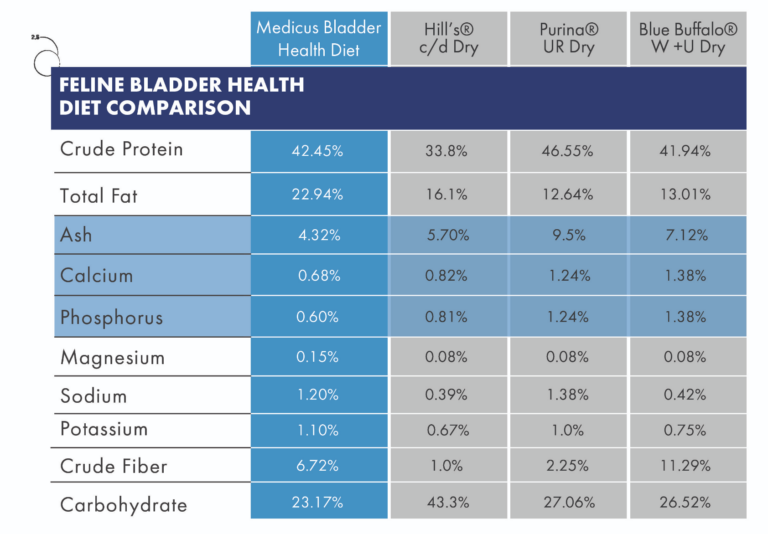
Clinical Evidence
The Feline Medicus Bladder Health Diet provides nutrition clinically proven to dissolve and prevent struvite stones and minimize calcium oxalate formation.
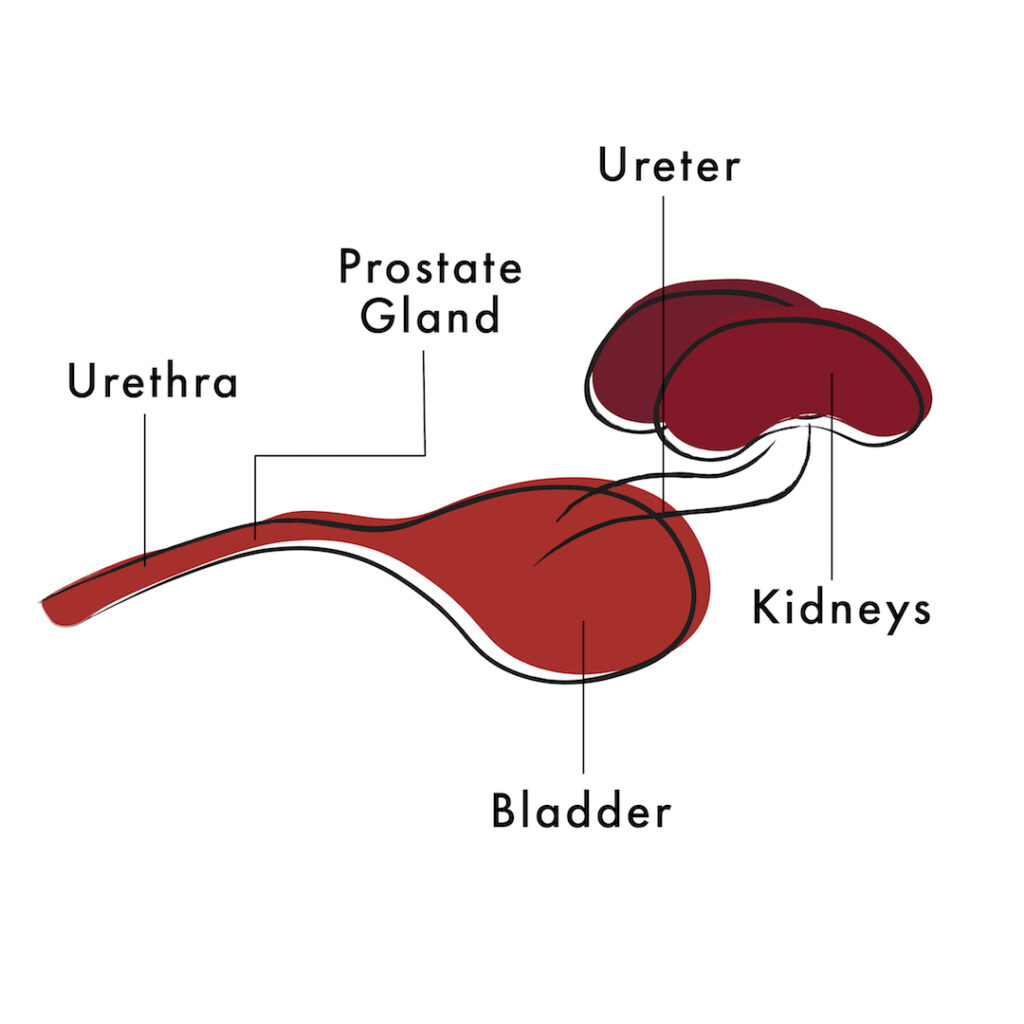
Bladder Issues in Cats
The domesticated cat originated from the desert cat and, as such, has the genetic ability to concentrate urine in the face of dehydration. When concentrating urine, the cat also concentrates minerals that make up crystals in the urine that can eventually congregate into bladder stones. Concentrated urine is also more caustic and can irritate the bladder and urethra.
Urinary issues may have more than one potential cause, making diagnosing and treating them complex.
Some potential causes of urinary issues in cats include:
- Poor diet with excessive intake of carbohydrates and not enough fluids
- Dry Diet
- Not enough fluid consumption
- Stones, crystals, or debris building up in the urethra or bladder (urolithiasis)
Supporting Bladder Health through Nutrition
RSS Testing can be used to discern the efficacy of a diet in managing urolithiasis in dogs and cats. Results can tell you whether a diet is able to manage both types of uroliths, struvite, and calcium oxalate.
Struvite (Cats)
To dissolve struvite uroliths, the ideal RSS diet for dissolution has an RSS for struvite at or <1 (i.e., undersaturated for struvite).
To aid in the prevention of struvite stones, the target is an RSS at or < 2.5 (i.e., Metastable for struvite).
Calcium Oxalate (Cats)
It is not possible to dissolve calcium oxalate stones.
The ideal RSS diet to help decrease the risk of calcium oxalate urolith formation will have an RSS for calcium oxalate <12 (i.e., metastable) and ideally < 10 (i.e., undersaturation)
Study Design
The study ran for twenty-three days and started upon initiation of the test diet. Beginning on Day 22 of the study, a 24-hour urine sample was collected from each cat for RSS analysis. On Day 23 of the study, urine volume was measured, and urine pH and specific gravity analyses were performed on the 24-hour urine sample from each cat. The urine samples were then processed and sent out for RSS analysis.
Urine pH, Specific Gravity, and RSS results: The 24-hour urine pH values ranged from 6.42 to 7.37 (avg. 6.92), urine volume ranged from 40 to 103 milliliters (avg. 64 milliliters), and specific gravity values ranged from 1.028 to 1.065 (avg. 1.052).
The Medicus Feline Bladder Diet Study Results
The RSS Struvite for Medicus Veterinary Diet Feline Bladder is an average of .26 documenting undersaturation for struvite and supporting dissolution of struvite uroliths and prevention of struvite stone formation.
The RSS Calcium Oxalate monohydrate (COM) and Calcium Oxalate dihydrate (COD) for Medicus Veterinary Diet Feline Bladder is an average of 2.64 / 1.15 respectively documenting undersaturation and supporting prevention of Calcium Oxalate urolith formation.
RSS for struvite at or <1 (ie, undersaturated for struvite)
Clinical evidence shows that Medicus’ Feline Bladder Health Diet carefully balances whole food nutrition and restrictive mineral nutrient concentrations to support the cat with chronic urinary issues.
Ingredients
Chicken, Egg, Rice, Flaxseed, Chicken Liver, Chicken Gizzards, Ground Krill, Cranberries, Blueberries, Potassium Salt, Sea Salt, Ground Egg Shell, Apple Cider Vinegar, Glucosamine, Mixed Tocopherols, Zinc Proteinate, B Vitamins(Niacin, Riboflavin, Thiamine, Vitamin B12, Pyridoxine, and Folic Acid)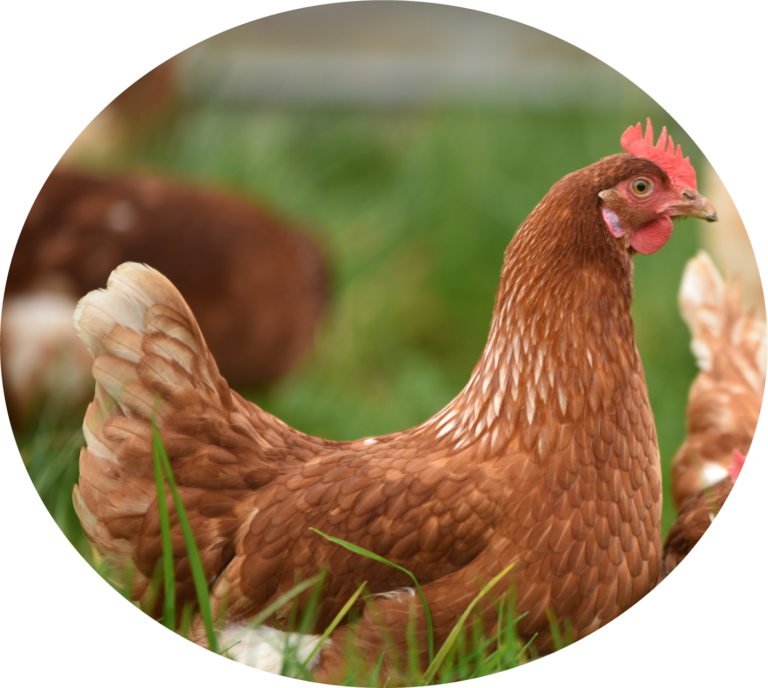
Chicken
A lean, warming protein rich in B6, iron, zinc, and selenium.
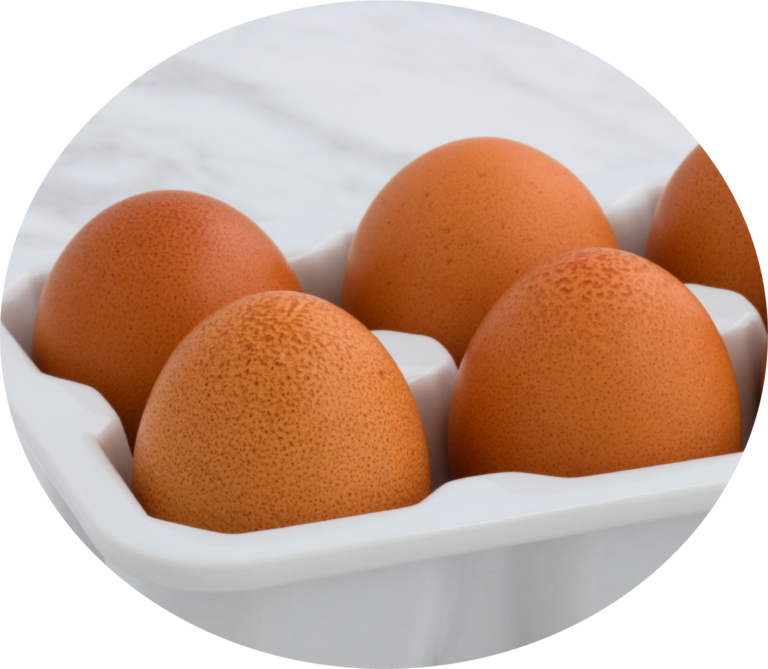
Egg
The egg itself is a complete protein, meaning it has all nine amino acids the body needs from food and is low in phosphorus.
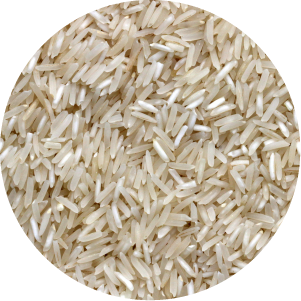
Rice
Adding just enough rice to the recipe dampens the high phosphorus content of the high-quality meats– a mineral that contributes to crystal formation.

Flaxseed
Full of polyphenols, an antioxidant that defends against oxidative stress to decrease inflammation.

Chicken Liver
The liver is also rich in CoQ10, which generates energy in cells but also serves as an antioxidant. Antioxidants help neutralize free radicals (reactive atoms produced by oxidative stress) in our bodies.
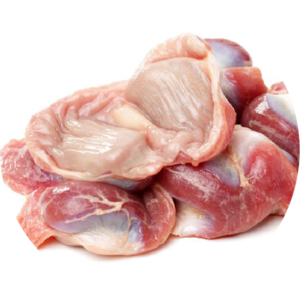
Chicken Gizzards
Rich in cartilage and glucosamine, plus a great source of protein, zinc, Vitamin B12, and iron.
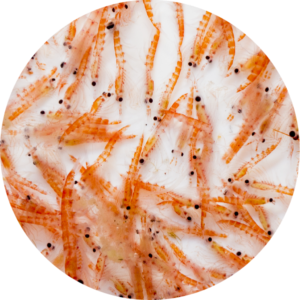
Ground Krill
Brimming with nutrients including marine proteins, essential fatty acids, and a powerful antioxidant called astaxanthin, the combination is a powerful anti-inflammatory.

Cranberries
Cranberry acidifies urine to create an unfavorable environment for bacteria growth like E.coli, the most common culprits of UTIs. It also handcuffs itself to the bacteria preventing it from attaching to the bladder wall.
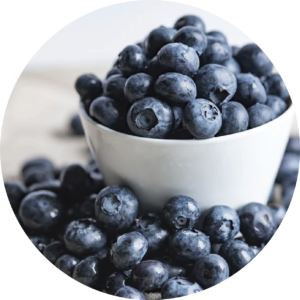
Blueberries
The highest amount of antioxidants among any fruit, blueberries help counteract oxidative stress to decrease inflammation.
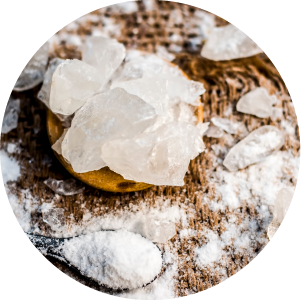
Potassium Salt
Used as an electrolyte replenisher to ensure adequate potassium levels.

Sea Salt
Salt helps cells move nutrients and waste where it needs to go.
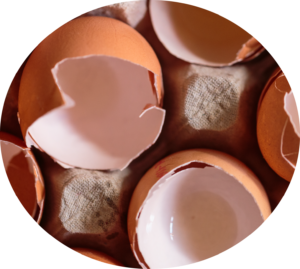
Ground Egg Shell
The shell is rich in calcium, and the membrane lining offers collagen, chondroitin, hyaluronic acid, and glucosamine.
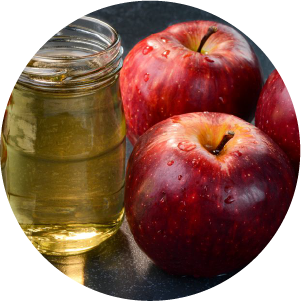
Apple Cider Vinegar
Apple cider vinegar can help to neutralize the bacteria that have populated in the urinary tract. It also slightly acidifies the urine.

Glucosamine
Glucosamine coats the inner lining of the bladder to protect from irritation.
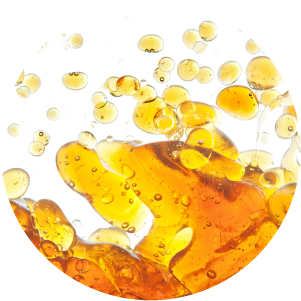
Mixed Tocopherols
Part of the vitamin E family (akin to vegetable oil) & often used as a natural preservative to maintain freshness.
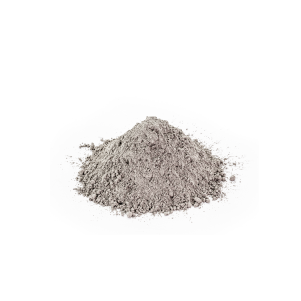
Zinc Proteinate
A chelated mineral bound to an amino acid that protects against oxidative stress.

B Vitamins
Niacin, Riboflavin, Thiamine, Vitamin B12, Pyridoxine, and Folic Acid are incredibly fragile B vitamins. They help a variety of enzymes do their jobs, so food more easily turns into energy in the body.
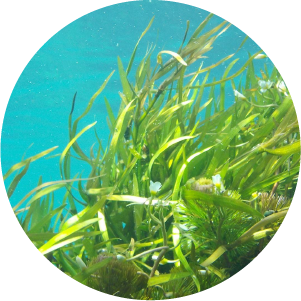
Kelp
Naturally high in antioxidants with anti-inflammatory properties, and it’s a natural form of iodine.

